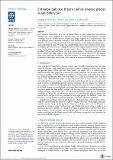Enthalpy balance theory unifies diverse glacier surge behaviour
Abstract
It is commonly asserted that there are two distinct classes of glacier surges: slow, long-duration ‘Svalbard-type’ surges, triggered by a transition from cold- to warm-based conditions (thermal switching), and fast, shorter-duration ‘Alaska-type’ surges triggered by a reorganisation of the basal drainage system (hydraulic switching). This classification, however, reflects neither the diversity of surges in Svalbard and Alaska (and other regions), nor the fundamental dynamic processes underlying all surges. We argue that enthalpy balance theory offers a framework for understanding the spectrum of glacier surging behaviours while emphasising their essential dynamic unity. In this paper, we summarise enthalpy balance theory, illustrate its potential to explain so-called ‘Svalbard-type’ and ‘Alaska-type’ surges using a single set of principles, and show examples of a much wider range of glacier surge behaviour than previously observed. We then identify some future directions for research, including strategies for testing predictions of the theory against field and remote sensing data, and priorities for numerical model development.
Citation
Benn , D I , Hewitt , I J & Luckman , A J 2023 , ' Enthalpy balance theory unifies diverse glacier surge behaviour ' , Annals of Glaciology , vol. 63 , no. 87-89 , pp. 88-94 . https://doi.org/10.1017/aog.2023.23
Publication
Annals of Glaciology
Status
Peer reviewed
ISSN
0260-3055Type
Journal article
Collections
Items in the St Andrews Research Repository are protected by copyright, with all rights reserved, unless otherwise indicated.

